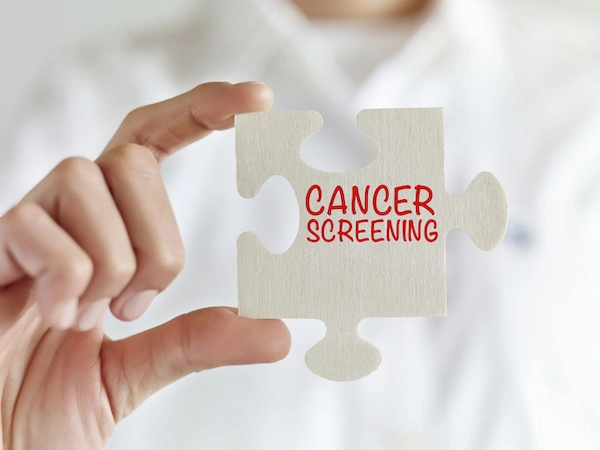What Are The Various Cancer Screening Options?

Globally, cancer remains a significant health concern, with millions of new cases diagnosed each year. Cancer screening emerges as a pivotal tool in the quest for early detection. These tests are designed to detect signs of cancer before symptoms manifest, offering a crucial window for intervention.
Research underscores the effectiveness of screening, revealing that early detection can substantially enhance treatment success rates and even lead to potential cures. The American Cancer Society reports a remarkable 20% decline in U.S. cancer deaths over the past two decades. This progress in screenings, lifestyle modifications, and medical advancements saved over 1.7 million lives.
Beyond saving lives, early detection also expands treatment options while curbing the overall cost of cancer care. Let us explore the various cancer screening options to safeguard our well-being proactively.
What is Cancer Screening?
Cancer screening involves various tests and procedures designed to detect cancer at an early stage, often before symptoms appear. These screenings aim to identify abnormalities or signs of cancerous growth when they are small and more treatable. Common screening methods include imaging tests like mammograms and colonoscopies, as well as laboratory tests like Pap smears and blood tests for certain tumor markers.
The goal of cancer screening is to increase the chances of successful treatment and improve outcomes by catching cancer in its earliest and most treatable stages. It plays a crucial role in preventive healthcare and early intervention strategies.
With extensive expertise, Dr. Sumant Gupta is dedicated to detecting cancer early through various screening tests. He ensures accessible and affordable screening options for all patients, emphasizing the importance of early detection in improving treatment outcomes. Dr. Gupta’s compassionate approach and commitment to preventive healthcare make him a trusted figure in the field.
What Are Its Advantages?
Cancer screening offers significant advantages in healthcare:
- Early Detection: Screening tests can identify changes in your body that could develop into cancer before any symptoms appear. This early detection gives you a head start in treating the cancer, often leading to better outcomes.
- Symptom-Free Identification: Screening tests can find cancer even if you feel perfectly healthy and haven’t noticed any symptoms. This means you can catch the cancer before it starts causing problems, allowing for earlier treatment.
- Preventing Spread: By detecting cancer early, screening tests can help prevent it from spreading to other body parts. When cancer is found and treated early, there’s a better chance of stopping it from growing and spreading, potentially saving lives and reducing the need for more aggressive treatments.
What are the Common Cancer Screening Tests?
Common cancer screening tests vary depending on the type of cancer being screened for. Here are some of the most widely used screening tests:
- Mammogram: A mammogram is an X-ray of the breast tissue used to detect breast cancer in its early stages. It’s recommended for women starting around the age of 40, although guidelines may vary based on individual risk factors.
- Pap Smear (Pap Test): This test involves collecting cells from the cervix to check for abnormalities that could indicate cervical cancer. It’s typically recommended for women starting at age 21 and should be done regularly per the healthcare provider’s recommendations.
- Colonoscopy: Colonoscopy is a procedure that allows a doctor to examine the inside of the colon and rectum for abnormalities such as polyps or signs of colorectal cancer. It’s generally recommended for adults starting around age 50, although earlier screening may be advised for individuals with a family history of colorectal cancer or certain risk factors.
- Prostate-Specific Antigen (PSA) Test: This blood test measures levels of PSA, a protein produced by the prostate gland. Elevated PSA levels may indicate prostate cancer, although further testing is needed to confirm a diagnosis. The decision to undergo PSA screening should be made after discussion with a healthcare provider, particularly considering the potential for false positives and overdiagnosis.
- Skin Exam: A thorough examination of the skin by a healthcare provider can help detect early signs of skin cancer, including changes in moles or new growths. Regular self-examination of the skin is also essential for early detection.
- Lung Cancer Screening: For individuals at high risk of lung cancer, such as heavy smokers, low-dose computed tomography (CT) scans may be recommended to detect lung cancer in its early stages.
These screening tests are crucial in detecting cancer early when treatment is most effective. Individuals should discuss with their healthcare providers to determine which tests are appropriate for their age, gender, and risk factors.
Dr. Sumant Gupta explains, “Cancer screening tests are generally reliable but not always perfect. Sometimes, they may miss cancer or give false alarms, causing unnecessary worry. However, advancements in technology have greatly improved accuracy. Newer tests, like liquid biopsies and genetic screenings, are revolutionizing early detection. These tests analyze blood or genetic material for signs of cancer, offering promising results. It’s crucial to understand that while no test is flawless, regular screenings remain our best defense against cancer, helping catch it early when treatment is most effective.”
Riya Sharma, a patient of Dr Gupta, shares, “Thanks to Dr. Sumant Gupta’s expertise in cancer screening, I was able to detect breast cancer at an early stage through a mammogram. His compassionate care and thorough explanations eased my worries, and I am grateful for his dedication to early detection.”
What Is the Cost of Different Cancer Screening Tests In India?
The cost of different Cancer Screenings in India is as follows:
- Mammogram: Typically ranges from INR 1,000 to 5,000 (USD 15 to 70).
- Pap Smear (Pap Test): Costs approximately INR 500 to 2,000 (USD 7 to 30).
- Colonoscopy: Prices vary widely, ranging from INR 3,000 to 15,000 (USD 40 to 200).
- Prostate-Specific Antigen (PSA) Test: Generally costs INR 500 to 2,500 (USD 7 to 35).
- Skin Exam: Often included in routine check-ups; additional dermatologist visits may cost INR 500 to 2,000 (USD 7 to 30).
However, the cost can vary depending on several factors, including
- Type of Screening Test: Different screening tests have varying costs. For example, a mammogram may cost differently than a Pap smear or a colonoscopy.
- Healthcare Provider or Facility: Costs may differ between public and private healthcare facilities, with private facilities generally charging higher fees.
- Geographical Region: Urban areas may have higher costs than rural areas due to differences in infrastructure and resources.
Conclusion
Cancer screening is a vital tool in early detection, allowing cancer to be detected before symptoms arise. By undergoing these tests, individuals can potentially detect cancer at its earliest and most treatable stages, leading to better outcomes and even saving lives. Prioritizing regular screenings empowers proactive health management and enhances overall well-being.
FAQs
-
At what age should I start getting screened for cancer?
Screening recommendations vary by cancer type and individual risk factors. Consult your healthcare provider for personalized guidance.
-
Are cancer screenings painful?
Most screening tests are minimally invasive and relatively painless. However, discomfort levels may vary depending on the specific procedure.
-
Can cancer screening tests give false-positive results?
Yes, some screening tests may yield false-positive results, indicating cancer when none is present. Follow-up tests are usually needed to confirm a diagnosis.
-
Do I need to prepare for a cancer screening test?
Preparation requirements vary depending on the type of screening test. Your healthcare provider will provide specific instructions if any preparation is necessary.
-
How often should I undergo cancer screening?
Screening frequency depends on age, gender, family history, and personal risk factors. Your healthcare provider will recommend a screening schedule tailored to your individual needs.
Read More : How Does Chemotherapy Work for Solid Tumors?
